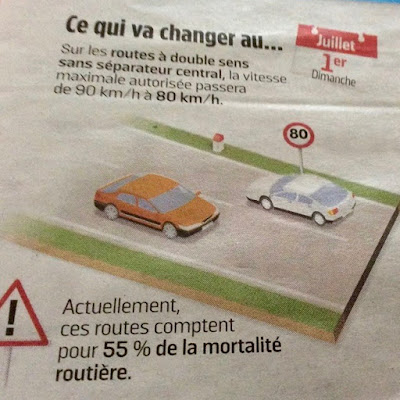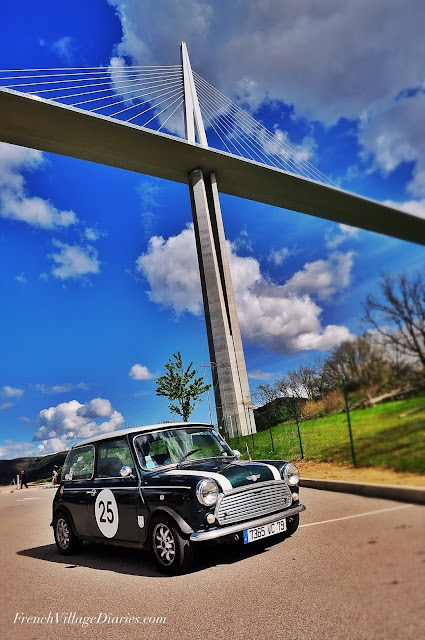 |
| Mini Cooper Road Trip |
We love taking road trips in France and as the summer holiday season begins, many more tourists will be taking to the roads, so I thought it was important to let you know that from tomorrow, 1stJuly 2018, some of the speed limits in France have been lowered, but there will be NO new signage to remind you.
According to the government website, speed is the main cause of fatal accidents in France (31%) and with 55% of road deaths occurring on roads without a central reservation, the speed limit on these has now been reduced to 80 km/h. At 80 km/h your stopping distance is 13 metres shorter than at 90 km/h and the hope is that this will save the lives of between 300 and 400 people each year. They also estimate that on average, by driving at 80 km/h instead of 90 km/h, we will all save around 120€ in fuel costs each year as well as reducing CO2 emissions by 30%.
 |
| Speed limit changes on the roads from Sunday 1st July 2018 |
Single carriageway roads with no central reservation where the speed limit was 90 km/h, has now been lowered to 80 km/h.
 |
| Speed limit changes on the roads from Sunday 1st July 2018 |
Roads that have two lanes in one direction and one lane in the opposite direction, with no central reservation, remain at 90 km/h for the two lanes but has now been reduced to 80 km/h for the one lane.
 |
| Speed limit changes on the roads from Sunday 1st July |
Roads with a central reservation, either two or four lane, will remain at 90 km/h.
A summary of the speed limits is as follows;
130 km/h (80 mph) on a motorway (110 km/h (68 mph) in the rain)
90 km/h (56 mph) or 110 km/h (68 mph) (if marked) on a dual carriageway with central reservation
90 km/h (56 mph) on a single carriageway with central reservation
80 km/h (50 mph) on a single carriageway
50 km/h (31 mph) in towns or villages (once you have passed the sign giving the town name until you have passed the name crossed out)
These apply unless otherwise stated, for example 70 km/h (43 mph) or 30 km/h (19 mph) restrictions can be found but will always be marked.
I had so much fun on the official public service, Gendarmerie and road safety websites, making sure I had my facts correct, that I thought I’d share a bit more information on driving in France with you. While this is by no means an exhaustive list of what is right and wrong when driving in France, I think it covers the basics, although do remember when in France, drive on the right.
Documents
By law when driving in France you must carry your driver’s licence, car registration documents and insurance documents with you at all times. Failure to present your driver’s licence and car documents can carry an immediate fine of 11€ (increased to 135€ if you fail to provide them within five days). Failure to provide proof of insurance can carry an immediate fine of 135€. I also carry a photocopy of my passport for ID purposes and it is also a good idea to carry your EHIC European Health card and details of your travel insurance too.
Drink Driving
The legal alcohol limit in France is 0.2 g of alcohol per litre of blood. In England and Wales, it is 0.8 g and in Scotland 0.5 g. In March 2012 it became law to carry a disposable breath testing kit in your car at all times. However, in March 2013, the fines imposed for not having one were removed. It is still law to have one, but there are no repercussions for those caught without one!
What to carry in the car
It has been a legal requirement to carry a warning triangle and a high vis jacket since 2008. The jacket must be kept in the car (not the boot) to enable the driver to put it on before exiting the vehicle following a breakdown or accident. Failure to have them can carry a fine of up to 135€.
All vehicles must be equipped with headlights in a working order and being stopped with a non-functioning headlight can result in a fine of up to 180€ and the impounding of your car. You must change a blown bulb immediately, which is why it is recommended that you carry spare bulbs in the vehicle at all times.
Radars
The use of real-time devices that detect the presence of fixed or mobile radars and police cameras has been against the law since 2012. This can include GPS SatNavs, even if they are built into the car, or a mobile phone app that warns of the positioning of speed cameras. This can carry a fine of up to 1,500€.
Children
Children must be in age/weight appropriate car seats and under tens must sit in the back, except for the rear-facing baby seats, which can go on the front passenger seat so long as the airbag has been disabled.
STOP signs and red lights
Not respecting a STOP sign or a red light at traffic lights can result in a fine of up to 135€. Please note according to the French highway code you must stop when you see the lights change to amber.
It is also against the law to drive while using a mobile phone (135€ fine) and if the driver or any passenger is not wearing a seatbelt (135€ fine).
If you too want to visit the fascinating websites where I found my information, here they are.
This post has been linked to Paris in July.



No comments:
Post a Comment
Please don't be shy, I love to hear from you.